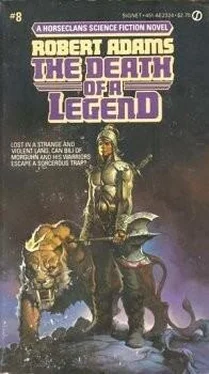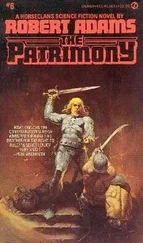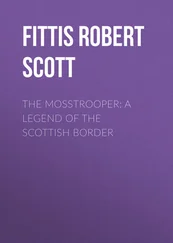With no time to care for the niceties and formalities, Bili leaned to grasp the back of the woman’s swordbelt and, lifting her effortlessly, plunked her belly down on his crupper.
Komees Hari came alongside, his big gray stallion tight-reined and seemingly half mad with fear. “It can only be an earthquake, Bili. I thought me there was something odd, something disturbing about this damned plateau. We’ve got to get off of it… fastr
Bili nodded once, turned in the saddle to face his column and shouted, “THAT WAY,” pointing an arm in the direction taken by the fleeing wildlife. Mahvros was too submerged in his terror to respond to mindspeak, so Bili reined him over to the right. His booted heels beat a tattoo on the black barrel and evoked a more than willing response; exhaustion clean forgotten, the big horse raced flat out toward the track of the game beasts.
The column followed as best they might while trees crashed around them, and huge boulders shifted, slid and tumbled. After their young lord they went, heedlessly putting their panic-stricken mounts at the impossibly narrow, suicidally steep descent down the precipitous face of the plateau.
. Had that plateau been higher at this its southern edge, none could have survived; but since it was much lower than in the north, all save the very tail of the column were galloping east and south and west on comparatively level ground when, with an awesome, grinding roar, the entire rocky face dissolved and slid down upon itself.
It was not until they were a birdflight mile from what had so recently been the foot of that small plateau that Bili brought his command first to a walk, then a full halt on the brushy slope of a long, serpentine ridge. Not even there was the earth completely still, but the occasional tremors were quickly forgotten, erased from their minds by the awesome and terrible wonder of the northern horizon.
Looming so huge that it looked close enough to touch, a roiling cloud of dense, opaque, multicolored smoke shot through with flame towered. Then, even as they watched, came a clap of sound of such a magnitude that horses shrieked and repeatedly reared, while men and women slapped hands to abused ears and rolled on the heaving hillside in agony. Some nameless force shredded the cloud, and among the remaining tendrils a vast host of smoking, blackish shapes could be seen rising high into the air. Of irregular conformation were the black objects, and no two of the same size. Some rose faster than others, farther, but all that could be followed with the eye soon plunged back toward earth, trailing smoke like impossibly huge pitchballs from the giant catapult of a god. And wherever they struck among the forested mountains and vales, red flame sprang into being. One of the shapes narrowly missed Bili’s party; falling, it bounced heavily in the narrow vale between their ridge and the one beyond. It finally came to rest within the bed of a tiny rill, and when the last tendrils of steam had dissipated, Bili and the rest could see that it was naught but a boulder. But what a boulder! It was a boulder big enough for two destriers to have stood upon, uncrowded. And upon its broad face, certain cryptic carvings were plainly to be seen.
At sight of the boulder, the brahbehrnuh uttered a single piercing shriek. Then her eyes rolled back in their sockets and she collapsed, bonelessly, at Bili’s feet.
A westering sun cast its last blaze of light over the gray rock and the dark-green growth of the mountain fastnesses. To the north and south and east of a certain small, steeply walled valley, a pall of smoke filtered that sunlight, and here and there under that smoke blazed fires wrought of the red-hot stones flung far and wide in the explosive death of a distant mountain.
Nor had raging forest fires been the only violence spawned by that mountain’s death agonies, for a hellish jumble of tumbled rock and splintered trees was now all that remained of what had very recently been a plateau bearing at least one Ahrmehnee village.
After the reckless gallop down from that doomed plateau, Bili’s war party had found that any eastward progress was an impossiblity due to the roaring holocaust. Indeed, they had been compelled to flee northwesterly before the fires which were driven on a strong wind from the southeast. Amid the roiling smoke and confusion, among hills irrevocably altered by the earth tremors, not even the native Ahrmehnee warriors could be certain where they were, and the main party had become somehow separated—roughly two-thirds of them fleeing behind Bili of Morguhn, with the contingent which had included Komees Hari Daiviz and Sir Geros Lahvoheetos all gone to Wind for all anyone knew.
It was a motley group which now lay encamped along the banks of the stream that chuckled through the narrow, steep-walled valley. Three distinct languages, plus several regional dialects, were to be beard in that camp. Middle Kingdoms Freefighters rubbed scale-shirted elbows with Ahrmehnee warriors in thigh-length hauberks of beautifully fashioned chain mail, Confederation noblemen supped their meager rations across the fires from man-despising Moon Maidens, and the winter-sere grasses were cropped by a conglomerate herd of lowland destriers and chargers, the finely bred warhorses of the Maidens and the rough-coated mountain ponies of the Ahnnehnee.
Their unsatisfying scratch meal too soon consumed, most of the party settled for the fast-closing night; they huddled about the fires, wrapped in cloaks or saddle blankets, vainly seeking warmth and comfort on the hard, stony ground. Here and there wounded men and women whimpered or groaned in agonized wakefulness or moaned in delirium.
Vahrohneeskos Gneedos Kamruhn of Skaht saw his semiconscious brother made as comfortable as possible, then left him in the care of a grizzled Freefighter and slowly picked a way between the knots of supine warriors toward where the largest fire blazed, its leaping flames reflected from the burnished breastplate and smooth, shaven scalp of him who was become the uncontested leader of all—Thoheeks Bili, Chief Morguhn of Morguhn.
Gneedos mused as he walked, thinking it somewhat odd that these fierce Ahnnehnee headhunters, who had hated and warred upon lowlanders for hundreds of years, not to mention the fabled, man-hating Moon Maidens, had not presumed to question even the least of Bili’s orders. But then the vahrohneeskos reflected that for all their outré customs and barbaric usages, this particular group of Ahrmehnee and Maidens were all proved and veteran warriors to whom the easy and natural assumption of command by a born war leader such as Bili would seem right and proper. Despite the fact that he had yet to see his twentieth winter, Bili of Morguhn was that rare kind of man—a fighting chieftain of fighters, his invisible mantle of leadership evident to all, be they old or young, male or female, Ehleen or Kindred or Burker or mountaineer.
Tall towered this man the burker mercenaries had dubbed “Bili the Axe,”
big-boned and heavily muscled, with wide shoulders and hips giving purchase to the sinews which enabled him to swing his huge, heavy axe as easily and effortlessly as a normal man employed his broadsword or saber.
As did many professional fighting men in the Middle Kingdoms of the north, wherein he had fostered some ten years and had his war training, fighting in the army of the Iron King, Gilbuht of Harzburk, Bili kept his scalp shaved smooth for reasons of cleanliness and comfort under a much-worn helmet. But his eyebrows were a blond as light as the tassels of green maize. Where not darkened by sun and weather, his skin was a fair pink-white, and his eyes were of a variable blue. Once, not too long back, those eyes had easily and often warmed with humor and friendliness, but now they were become cold and hard, when not wary and quick-darting, the skin at their outer corners beginning to permanently crinkle and the brow above them to furrow with the weights and worries of command.
Читать дальше












